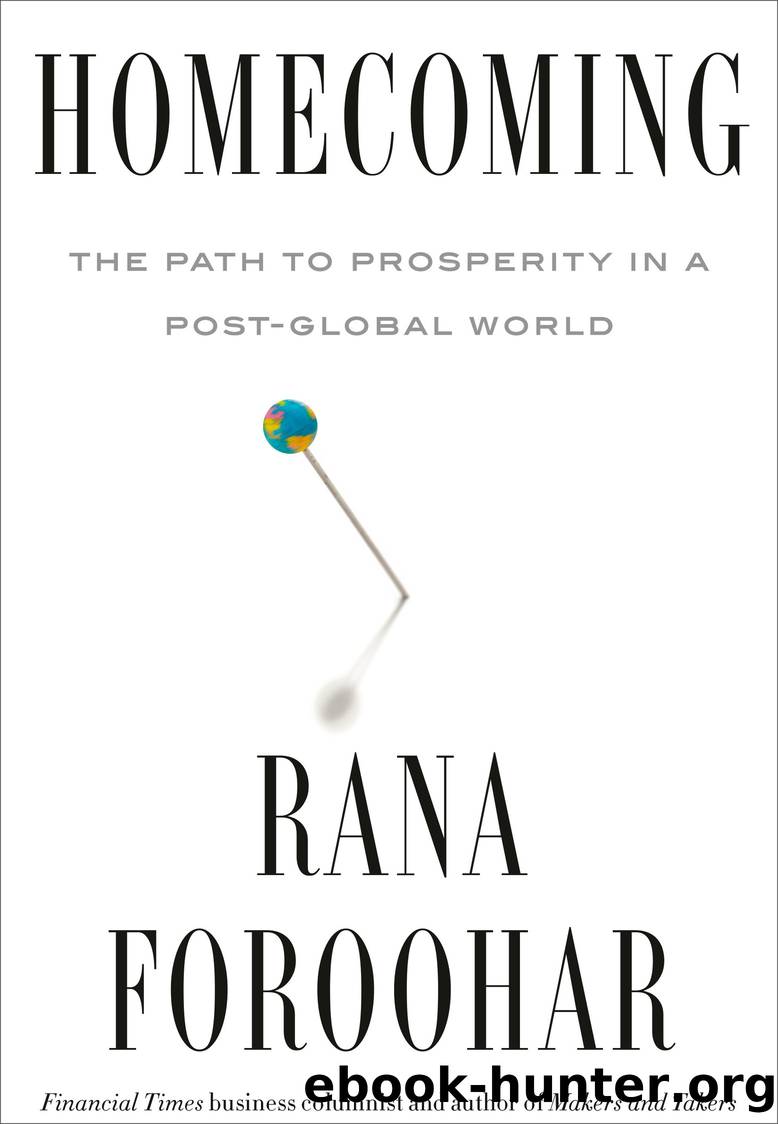Homecoming by Rana Foroohar

Author:Rana Foroohar [Foroohar, Rana]
Language: eng
Format: epub
Publisher: Crown
Published: 2022-10-18T00:00:00+00:00
Two Americas
Amazingly, the notion of place was, until quite recently, not really thought about in economics. Theory was important; the particulars of how a theory worked in specific parts of any given nation were not. Sure, development economists would consider how to bring up the fortunes of various countries, but the prescriptions for how to do that were unidimensional: follow the IMF prescriptions for privatizing your economy and opening up to free global trade and liberal financial markets andâpresto!âwatch the wealth and prosperity rise. I wonât rehash the excellent work of the many critics who have debunked these ideas, like economist Joseph E. Stiglitz. But today, even the IMF itself has reconsidered the export of neoliberal globalization; in the summer of 2016, some of its top economists issued a paper[1] saying that its benefits had been âoversold,â which was a bit like the pope telling us catechism had been oversold.[2]
There were always, it must be said, certain economists, going as far back as the beginnings of the neoliberal era, who thought differently. Karl Polanyi, an Austro-Hungarian economic historian, was critiquing classical economic views as early as 1944, claiming that totally free markets were a utopian myth, because the things that allowed markets to function properly were underpinned by states.[3] Scholars of the postwar periodâincluding people ranging from Nobel laureate Stiglitz and the University of Chicagoâs Raghuram Rajan to MITâs Simon Johnson and Daron Acemogluâunderstood that place mattered. As Stiglitz, who grew up in working-class Gary, Indiana, once told me, âIt was obvious if you were raised in a place like Gary that markets arenât always efficientâ and that, in terms of economic outcomes, location mattered.
But over the last couple of decades, a growing body of research has supported these ideas. From the work of people ranging from Thomas Piketty, to Emmanuel Saez and Gabriel Zucman, to Raj Chetty and Thomas Philippon, there is now a consensus that not only does the invisible hand work imperfectly, but it works differently depending on where and when you were born. Things like the level of public health or the quality of the water where you live actually matter in terms of economic outcomes. So does the stress present for a mother while her child is in utero and the wellness of a baby at birth.[4]
For example, one 2011 study published by academics Janet Currie and Douglas Almond found that âchild and family characteristics measured at school entry do as much to explain figure outcomes as factors that labor economists have more traditionally focused on, such as years of education.â A raft of literature shows that âpoorer children have worse cognitive, social-behavioral and health outcomes in part because they are poorer.â[5] And of course, different parts of the country fare better or worse on those measures. The outcomes matter based on not just states or regions but also neighborhoods. In the United States, inequality across neighborhoods explains a great deal of the variation in childrenâs access to good healthcare, education, and public services, which in turn matters for productivity and growth.
Download
This site does not store any files on its server. We only index and link to content provided by other sites. Please contact the content providers to delete copyright contents if any and email us, we'll remove relevant links or contents immediately.
Zero to IPO: Over $1 Trillion of Actionable Advice from the World's Most Successful Entrepreneurs by Frederic Kerrest(4568)
Machine Learning at Scale with H2O by Gregory Keys | David Whiting(4313)
Never by Ken Follett(3955)
Harry Potter and the Goblet Of Fire by J.K. Rowling(3856)
Ogilvy on Advertising by David Ogilvy(3622)
Shadow of Night by Deborah Harkness(3367)
The Man Who Died Twice by Richard Osman(3077)
Book of Life by Deborah Harkness(2938)
The Tipping Point by Malcolm Gladwell(2921)
Will by Will Smith(2919)
Purple Hibiscus by Chimamanda Ngozi Adichie(2853)
0041152001443424520 .pdf by Unknown(2845)
My Brilliant Friend by Elena Ferrante(2831)
How Proust Can Change Your Life by Alain De Botton(2814)
How to Pay Zero Taxes, 2018 by Jeff A. Schnepper(2655)
Hooked: A Dark, Contemporary Romance (Never After Series) by Emily McIntire(2553)
Rationality by Steven Pinker(2363)
Can't Hurt Me: Master Your Mind and Defy the Odds - Clean Edition by David Goggins(2341)
Borders by unknow(2313)
